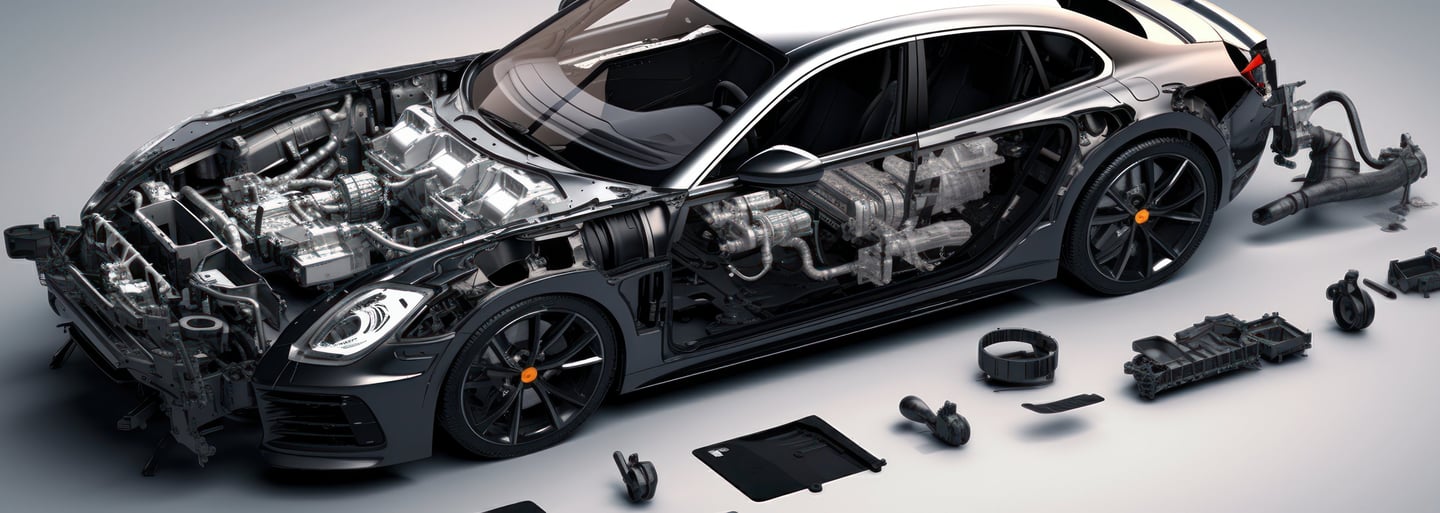ESSARR 4X4
How to Choose the Right Spare Parts for Your Vehicle
Vehicle spare parts are crucial for maintaining performance, safety, and longevity, with options including OEM parts for guaranteed quality, aftermarket parts for cost-effectiveness with varying reliability, and refurbished parts as an affordable middle ground. High-quality parts can be identified through material durability, certifications, and brand reputation. Ensuring compatibility involves consulting vehicle manuals, decoding the VIN, and using online tools.
11/21/20248 நிமிடங்கள் வாசிக்கவும்


Understanding Vehicle Spare Parts
Vehicle spare parts play a pivotal role in the maintenance and performance of any automobile. They not only ensure the vehicle operates at its optimum capacity but also significantly influence its longevity and reliability. Selecting the appropriate spare parts is essential, as it can affect the overall functionality and safety of the vehicle. Understanding the various categories of spare parts is an important aspect for vehicle owners.
Spare parts are generally classified into three main types: Original Equipment Manufacturer (OEM) parts, aftermarket parts, and refurbished parts. OEM parts are made by the vehicle's manufacturer and are designed specifically for your make and model. The primary advantage of using OEM parts is their guaranteed compatibility and reliability. They often come with warranties that ensure quality, thereby reducing the risk of malfunctions. However, OEM parts can be relatively expensive, which is a consideration for many vehicle owners.
In contrast, aftermarket parts are produced by third-party manufacturers and can offer a more budget-friendly alternative. These parts can vary widely in quality, as they are not subject to the same manufacturing standards as OEM parts. While some aftermarket parts are designed to match or exceed OEM specifications, others may compromise on quality. It is crucial for consumers to research and choose reputable brands to avoid potential performance issues.
Refurbished parts are used components that have been restored to a working condition. This option might appeal to those looking for a cost-effective solution. While refurbished parts can be a good compromise between quality and cost, it is important for buyers to ensure they are sourced from reliable sellers who guarantee their restoration quality. Choosing the right type of spare part is essential, as it directly impacts a vehicle's performance and overall maintenance efficiency.
Identifying Quality Spare Parts
When choosing spare parts for your vehicle, understanding the indicators of quality is paramount. Quality spare parts significantly influence the performance and longevity of a vehicle. Therefore, meticulous attention should be paid to various aspects that signify a part's reliability and effectiveness.
One of the primary elements to consider is the material composition of the spare part. High-quality spare parts are often made from robust materials that can withstand the stresses of regular use. For instance, rubber components should be resistant to wear and heat, while metal parts should ideally be manufactured from durable alloys that resist corrosion and deformation. Thoroughly reviewing product specifications can help discern the materials used in manufacturing.
Manufacturing standards and certifications are additional indicators of quality. Recognized certifications, such as ISO 9001, denote that a part has been produced under stringent quality management systems. Furthermore, reputable manufacturers often adhere to industry standards, ensuring that their products meet or exceed minimum performance criteria. It is advisable to inquire about these certifications before making a purchase.
Brand reputation also plays a crucial role in the assessment of spare parts. Renowned brands usually invest substantially in research and development, leading to improved product designs and superior quality. Moreover, customer reviews can provide invaluable insights into a part's reliability. Evaluating feedback from previous buyers gives potential consumers a clearer picture of the spare part's performance in real-world applications.
In essence, when identifying quality spare parts for your vehicle, one should prioritize the material composition, manufacturing standards, certifications, brand reputation, and customer reviews. Each of these elements forms an integral part of ensuring that the spare parts you choose will be dependable and enhance your vehicle's performance.
Matching Spare Parts to Vehicle Specifications
Choosing the correct spare parts for a vehicle is crucial for maintaining its performance, safety, and longevity. One of the first steps in ensuring that the right components are selected is to consult the vehicle’s manual. This manual contains invaluable information regarding the specifications required for various parts. It typically includes detailed descriptions of components, OEM (Original Equipment Manufacturer) part numbers, and even recommended substitutes for certain parts. By adhering to these guidelines, vehicle owners can significantly reduce the risk of selecting incompatible components.
Another essential element in matching spare parts to a vehicle is understanding the VIN (Vehicle Identification Number). The VIN is a unique code assigned to each vehicle that contains information about its make, model, and engine type. By decoding the VIN, individuals can quickly identify the exact specifications needed for replacement parts. Various online tools and resources allow for VIN decoding, making it easier for owners to assert compatibility with spare parts. This level of attention to detail can also prevent costly errors resulting from generic replacements that do not meet the vehicle’s requirements.
Utilizing e-catalogs or data management systems can further streamline the process of finding compatible parts. Many automotive suppliers provide online databases that include filters for selecting vehicle make, model, and year to ensure compatibility. These tools are particularly useful for car enthusiasts or individuals performing extensive repairs, as they provide quick access to a wide range of manufacturer-approved components. Additionally, engaging in visual inspections of existing parts, along with taking precise measurements, can reinforce the assurance that the selected replacements will fit seamlessly into the vehicle. Correctly matching spare parts to vehicle specifications enables optimal performance and safety, ensuring the longevity of one’s investment.
Where to Obtain Spare Parts
When seeking spare parts for your vehicle, it is essential to explore various sources to ensure you find the best options available. One of the most reliable channels is through authorized dealerships. These dealerships offer genuine parts specifically designed for your vehicle make and model, ensuring optimal compatibility and performance. Although genuine parts may come at a higher price, their quality and reliability can provide peace of mind and reduce the risk of future issues.
Another prominent source for spare parts is online retailers. E-commerce platforms have become increasingly popular due to their convenience and extensive selection. They often feature competitive pricing, user reviews, and detailed product descriptions that can help you make informed purchasing decisions. However, it is crucial to verify the credibility of the online retailer and ensure that they provide high-quality products that meet your vehicle's specifications.
Local auto parts stores are a practical option for those who prefer to inspect parts in person. These stores often have knowledgeable staff that can assist with finding the right component for your vehicle. Additionally, they may carry a mix of aftermarket and original equipment manufacturer (OEM) parts, allowing for a range of price points and options depending on your budget and preferences.
Finally, junkyards can be an excellent source for affordable spare parts. Although these parts may be used, they can often be in good condition and function effectively in your vehicle. Shopping at a junkyard requires some patience and effort, as finding the right part might take time. Nevertheless, it is a cost-effective solution for those looking to save money on repairs or restoration projects.
Ensuring you compare prices and quality across these different channels is critical. Taking the time to research and evaluate your options will help you make an informed decision that balances cost with quality, ultimately leading to successful repairs for your vehicle.
The Impact of Price on Spare Parts Quality
When selecting spare parts for a vehicle, the price is often a significant factor for many consumers. While it may be tempting to opt for the cheapest options available, it is crucial to understand the relationship between price and quality in the realm of automotive components. Lower-priced spare parts can sometimes indicate compromises in material quality, manufacturing processes, or reliability standards. These parts may offer short-term savings but can lead to more severe issues down the road, potentially resulting in costly repairs and compromised vehicle safety.
Investing in higher-quality spare parts generally ensures better performance and longevity compared to their cheaper counterparts. Well-manufactured components are often subjected to rigorous testing and quality control, which can translate into improved durability and reliability. For example, a premium brake pad may come at a higher initial cost, but its enhanced performance and extended lifespan can outweigh the benefits of a low-cost alternative, particularly in safety-critical systems like brakes.
Furthermore, choosing to invest in quality components can yield long-term benefits that far surpass the initial price difference. By selecting durable and reliable spare parts, vehicle owners can enhance the overall performance and lifespan of their vehicle. In doing so, they may find that they spend less over the years on replacements and repairs compared to those who frequently opt for the lowest-priced alternatives.
Ultimately, evaluating cost against value is key when making decisions about spare parts. It is advisable for consumers to conduct thorough research, consider reputable brands, and weigh the long-term implications of their choices. Understanding this balance can lead to more informed purchasing decisions, facilitating a vehicle's optimal performance and overall reliability.
Understanding Warranties and Returns
When purchasing spare parts for your vehicle, comprehending the warranties and return policies is crucial to safeguard your investment. Warranties serve as a promise from the manufacturer or retailer that the parts will perform as expected for a specified duration. It is essential to pay attention to the details of the warranty coverage. Look for aspects such as the length of the warranty, what it covers, and whether it includes labor costs if the part fails. A robust warranty can provide peace of mind, ensuring that you are protected against defects and unforeseen failures.
In scenarios where a defective part is received, knowing how to handle the situation is vital. Most retailers will have specific procedures in place for filing a claim. This typically involves keeping the original packaging and documentation, such as receipts. These materials are often required to validate your claim and expedite the return process. Additionally, it is wise to ascertain whether the warranty allows for exchanges or requires the repair of defective parts. Understanding these procedures can save you from potential inconveniences.
Moreover, the significance of awareness regarding return policies cannot be overstated. Each retailer or supplier may have different stipulations surrounding returns, including time frames for returns and conditions related to acceptance. Familiarizing yourself with these policies ensures that you can act promptly should you need to return an item. For instance, certain retailers may require that the spare parts remain unopened or unused for a full refund. By keeping thorough records of your purchases, including receipts and packaging, you can avoid potential losses and ensure a smoother return experience if needed. Investing time to understand warranties and return policies can significantly enhance your purchasing experience and financial security in the long run.
Professional Installation or DIY: Making the Right Choice
When it comes to installing spare parts for your vehicle, one of the critical decisions you face is whether to undertake the task yourself or hire a professional. This choice hinges on several factors, including your skill level, the complexity of the part being installed, and potential cost implications. For individuals with a solid understanding of automotive mechanics and the necessary tools, a DIY installation may be an attractive option. It can lead to significant savings in labor costs while also providing a sense of accomplishment.
However, DIY installations require not only technical knowledge but also an adequate toolkit. Basic tools such as wrenches, screwdrivers, and torque wrenches are essential for successful installations. If the spare part requires specialized tools or advanced knowledge—such as for brake systems, electrical components, or engine parts—the project may exceed the capabilities of a typical car owner. In such cases, seeking professional assistance might be the most prudent choice, ensuring that the installation meets safety standards and operates correctly.
Additionally, safety should never be overshadowed. An improperly installed spare part can lead to severe vehicle malfunctions, which not only jeopardizes the vehicle's performance but potentially endangers the driver and passengers. Experts are trained to handle such installations and can guarantee that repairs are executed to the highest standards, mitigating the risk of mistakes that could lead to expensive repairs down the line.
In considering whether to opt for professional installation or to go the DIY route, one must weigh the pros and cons carefully. While self-installation may offer immediate cost benefits, the long-term implications of incorrect installation could render it a false economy. Thus, understanding your limitations and the specific requirements of the task at hand is essential. Opting for professional help when in doubt can save time, money, and, most importantly, enhance safety on the road.
About the company
Auto Tarun Pvt Ltd ( ESSARR 4X4 ), founded in October 2021, is your trusted partner for high-quality multi-car spare parts and accessories.
Contact us
autotarun.india@gmail.com
+91 8884111908 / 6360334998
© 2024 Auto tarun Pvt Ltd All rights reserved.
Mon -Sat : 9:30 am to 6:30 pm
NO.39 (MIG, 80 Feet Rd, Kengeri Satellite Town, Bengaluru, Karnataka


GSTIN : 29AAVCA9568M1ZD
autotarun.india@gmail.com
Email:
Get in Touch
